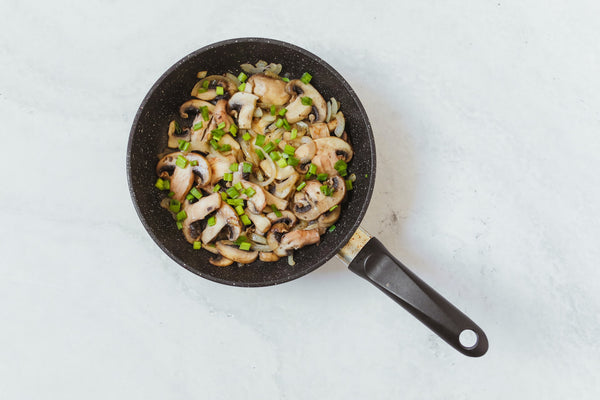5 Tips to Take Care of Your Pots and Pans
Healthy and safe cooking requires a clean kitchen to promote hygienic living and food safety. Cleaning pots and pans can be particularly difficult especially since grease, oils, and food residues can be difficult to remove from pots and pans, which are used frequently in the kitchen. Furthermore, food particles on pots and pans can grow bacteria, which can lead to health risks. Also, cooking in dirty pots and pans can also ruin the flavour of the meal. This article will provide you with five tips on how to clean pots and pans and take care of them for longer use.
Tip #1: Use the Right Tools
To ensure the best results, it is important to use the right cleaning tools for different types of pots and pans. For example, non-stick pans should be cleaned with non-abrasive sponges or brushes to avoid scratching the coating, while stainless steel or cast-iron cookware can withstand tougher scrubbing with scouring pads.
Using the right cleaning tool can also help remove tough stains and burnt-on food residue without damaging the surface of the cookware. Some examples of effective cleaning tools include sponges, scrub brushes, and scouring pads. A sponge is great for cleaning delicate surfaces, while a scrub brush can be used for pots and pans with a textured surface. Scouring pads, on the other hand, are perfect for removing stubborn stains and baked-on food from durable cookware.
Tip #2: Soak Pots and Pans
This method is particularly useful when trying to remove tough stains, burnt-on food or grease. By soaking your cookware, you can break down these stubborn particles and loosen them, making it much easier to remove them without using excessive force.
To soak your pots and pans, start by filling them with hot water and adding a few drops of dish soap. Let them sit for a period of time, depending on how dirty they are. The soap will help to break down the food particles and grease, while the hot water will help to loosen them. Despite it being a simple trick it can help you keep your kitchen tools clean efficiently.

Tip #3: Use the Right Cleaning Products
Cleaning pots and pans using the right cleaning products is crucial to maintaining their quality and extending their lifespan. Different types of cookware require different cleaning products, and it's important to choose the right product for the job. For example, non-stick frying pans require gentle cleaning products that won't scratch or damage the coating, while stainless steel pans can withstand more abrasive cleaners.
One of the most commonly used cleaning products for pots and pans is dish soap, which is great for everyday cleaning and removing food residues. Another kitchen tip and tricks you should know is using baking soda as a cleaning product that can be used to remove tough stains and burnt-on food. It's non-abrasive and safe for most types of cookware.
Vinegar is also a useful cleaning product that can be used to remove stains and disinfect the surface of pots and pans. It's particularly effective at removing mineral deposits and hard water stains. When using cleaning products, it's important to read the label and follow the manufacturer's instructions to ensure that you're using the product correctly and safely.
Tip #4: Clean Pots and Pans Immediately
Cleaning pots and pans immediately after use is an effective way to maintain their quality and prevent food from sticking to the surface. By cleaning pots and pans immediately after use, you can prevent food and grease from hardening and sticking to the surface, making it much easier to clean in the long run. To clean pots and pans quickly after use, rinse them with hot water and add a few drops of dish soap. Use a sponge or scrub brush to remove any food particles or grease, and rinse with hot water.
The benefits of cleaning pots and pans immediately after use are numerous. It prevents food from sticking to the surface, which can make cleaning more difficult later on. It also prevents bacteria from growing and can help to extend the lifespan of the cookware.

Tip #5: Take Care of Your Pots and Pans
Taking care of your pots and pans is essential to prevent the need for deep cleaning and to extend their lifespan. One of the most important things you can do is to use the right utensils when cooking, such as silicone or wooden utensils that won't scratch or damage the surface of the cookware. Additionally, avoid using high heat, as this can cause damage and reduce the lifespan of your cookware. When storing your pots and pans, use protective padding or place them in a stack to prevent scratches and other damage. By taking care of your cookware, you can ensure that it functions properly, making it a valuable investment for your kitchen.
In conclusion, keeping your pots and pans clean is an essential part of maintaining a clean and organised kitchen. By using the right cleaning products, soaking your cookware, and taking care of them, you can prevent food from sticking, extend their lifespan, and make cleaning much easier in the long run. So why not try out these kitchen cleaning tips for beginners? You'll be amazed at how much easier cleaning becomes and how much better your cookware will look and function. Remember to take care of your cookware, use the right utensils, and avoid high heat to keep them looking like new for years to come. With a little effort, you can achieve a clean and organised kitchen that will make cooking and home meal preps a breeze.
